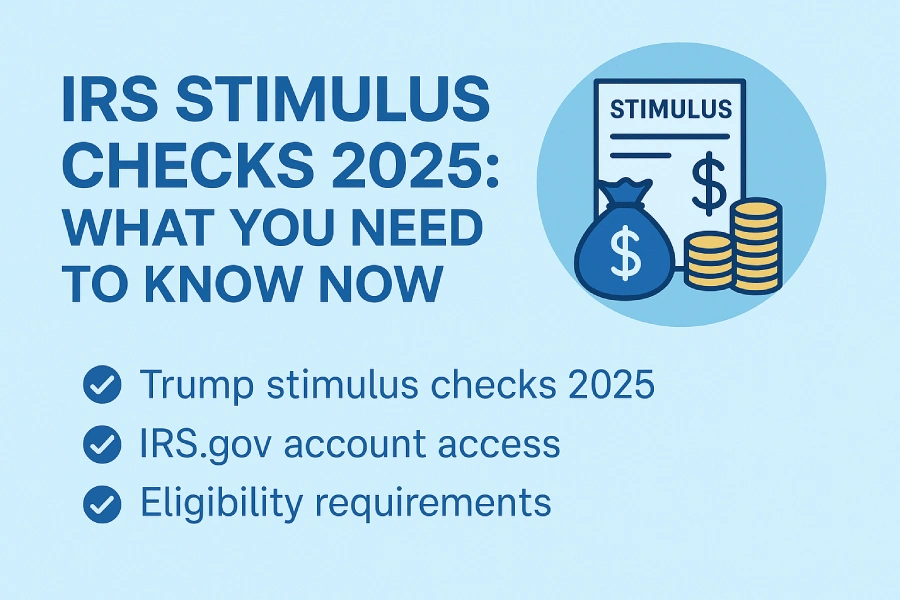As of July 2025, uncertainty surrounds whether a new stimulus payment will arrive this year. First, Congress passed the expansive “Big Beautiful Bill” on July 3, focused on reducing spending and restructuring healthcare, but it made no provision for a fourth federal stimulus payment. Meanwhile, the IRS recently made final automatic payments for unclaimed 2021 Recovery Rebate Credits. This guide offers a comprehensive legal and financial analysis for Americans tracking stimulus news, covering:
-
Why Congress didn’t include a stimulus payment
-
What happened with IRS-issued rebates in 2025
-
Trump’s DOGE dividend concept and its legal implications
-
Deadlines, eligibility, and taxpayer action items
-
Key FAQs drawing on high-search queries

1. Why the “Big Beautiful Bill” Didn’t Include a Stimulus Payment
On the eve of July 4, Congress passed the sweeping reconciliation package—dubbed the Big Beautiful Bill—consisting of multi-trillion-dollar cuts to Medicaid (projected $1 trillion over a decade) and reductions to Medicare funding. Despite earlier speculation—particularly from President Trump—about $2,000–$5,000 checks tied to government efficiency savings, the final legislation made no reference to any stimulus or rebate payments. The bill remains focused on tax restructuring and social safety net cuts without new direct transfers to households.
2. What About Those $1,400 Checks in Early 2025?
In December COVID-era financial relief efforts continued quietly: the IRS issued automatic payments—up to $1,400—to roughly one million Americans who had failed to claim their 2021 Recovery Rebate Credit. This action, part of an IRS December announcement, did not require filing amended returns and was delivered by January 2025 to eligible individuals. These payments were catch-up reimbursements, not new stimulus funding, and were made under authority of the 2021 credit law—not the reconciliation bill.

3. The Trump “DOGE Dividend” Concept Explained
A parallel track of speculation revolved around Trump’s mention of a “DOGE dividend”—a one-time payout funded by savings from the Department of Government Efficiency (DOGE), an initiative launched in January 2025 under his administration.
-
Elon Musk proposed handing out 20% of DOGE savings (initially estimated at $2 trillion) directly to households—about $5,000 each.
-
However:
-
DOGE’s actual savings are unverified; independent estimates vary widely.
-
Multiple lawsuits have challenged DOGE’s legality—citing unauthorized data access and potential constitutional threats.
-
Federal law requires a congressional appropriation before any check can be issued.
-
Budget and legal experts caution that this plan could raise debt and inflation.
-
So far, the DOGE dividend remains theory—not policy.
4. Legal Deadlines: Why You May Never See Missed Stimulus
The legal window for claiming unreceived stimulus ended with the April 15, 2025 deadline for Recovery Rebate Credit claims. The three-year statute of limitations on 2021 tax returns has now closed, and any unclaimed amounts have reverted to the U.S. Treasury. Late filers or those who missed the deadline cannot retroactively claim these funds—even if they filed extensions. The IRS has affirmed that no further claims will be accepted.
5. Tracking Your IRS Refund or Stimulus Status
If you did file and qualify for the Recovery Rebate Credit or received the $1,400 refund, here’s how to check:
-
Use the IRS’s “Where’s My Refund” tool, updated daily.
-
If you opted for direct deposit, funds typically arrive within 21 days.
-
Paper checks take 6–8 weeks.
-
For questions or missing payments, call the IRS refund hotline or request a Form 3911 payment trace.
6. What You Should Do (and Avoid)
If you missed filing by April 15:
-
You cannot claim the 2021 Recovery Rebate Credit.
-
Consider whether amending is worthwhile—for refunds related to other credits—but know stimulus is gone.
If you got the IRS auto-payment:
-
Confirm via IRS tool.
-
No additional action is needed.
If you’re chasing misinformation:
-
Beware of scams promising new checks—these are unverified.
-
Only IRS.gov and official congressional communications are reliable.
-
No fourth federal stimulus is currently in the works.
FAQs
1. Is there a fourth federal stimulus payment in 2025?
No. The Big Beautiful Bill contains no funding for a new federal stimulus payment.
2. Did anyone receive stimulus money in 2025?
Yes—about 1 million taxpayers received up to $1,400 in early 2025. These were back payments for 2021 Recovery Rebate Credit, not new stimulus funds.
3. What is the Trump “DOGE dividend” proposal?
It’s an unlegislated concept to issue checks from government savings. It lacks legal authority and remains speculative.
4. Can I still claim missing stimulus?
No. You must have filed a 2021 return by April 15, 2025. The recovery window is now closed.
5. How can I track my refund?
Use the IRS “Where’s My Refund” tool or call 800-829-1954. Direct deposits arrive within 21 days; paper checks take 6–8 weeks.
Legal & Financial Implications: A Deeper Look
A. Congressional vs. Executive Power
Only Congress can authorize payouts. Neither the reconciliation bill nor executive authority can generate stimulus without appropriation. The DOGE proposal—without legislative action—lacks legal standing.
B. Statute-of-Limitations Laws
The three-year deadline to claim tax refunds is irreversible. Extensions do not apply to Recovery Rebate Credits, and missing the April 15 deadline locks out any eligibility.
C. Liability of Misinformation
Scam sites and social media rumors threaten taxpayer security. Credible sources—IRS, Treasury, and congressional releases—must be trusted. Phony stimulus offers are a common vehicle for fraud.
D. Potential Inflation & Fiscal Risk
Analysts warn that paying out deficit-funded stimulus (like hypothetical DOGE checks) amid low unemployment and inflation (~3%) could trigger further price increases—counter to policy goals.
Conclusion
Stimulus payments in 2025 are legally simple: apart from the IRS’s automatic Recovery Rebate Credit payments in early 2025, no federal stimulus checks are pending or planned. Speculation around Trump’s DOGE dividend remains unlegislated. For most taxpayers, the only realistic remaining action is to monitor IRS refund status and ensure all prior credits were received. Misinformation poses a risk—reliable news outlets and government sources are essential.
By understanding deadlines, legal frameworks, and the difference between actual law and speculation, you’re best equipped to know what’s real and what’s rumor. Whether you’re tracking refunds or evaluating fiscal news, this is the definitive legal and financial guide to stimulus payment status in 2025.

